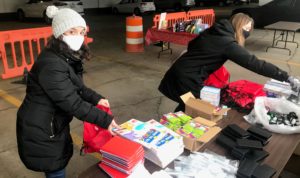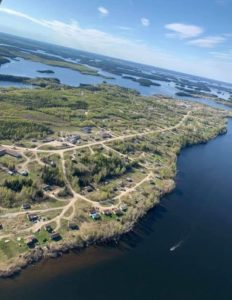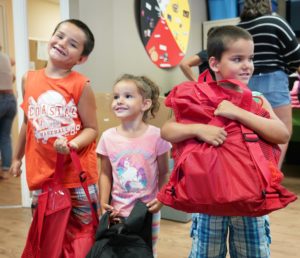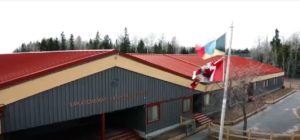Powering Reconciliation through Partnership
At Save the Children Canada, we want a world in which every child attains the right to survival, protection, development, and participation. However, we recognize that not all children’s rights are equally realized in Canada. Systems of inequality and discrimination make it difficult for First Nations, Métis, and Inuit children to exercise their rights.
Indigenous children and young people have the right to develop their full potential as valued and engaged citizens within their Indigenous nations and Canada. Indigenous children and young people have the right to a Canada where they can reclaim their identity, where their resilience is recognized and supported, and their culture is celebrated. That’s why the National Reconciliation Program (NRP) focuses on reconciliation through a child-centred approach, and it’s why we will continue to advance our commitment to address Indigenous child inequality and discrimination.
With the recent discoveries of mass graves of Indigenous children killed at former Residential Schools across the country; Canadians’ efforts to acknowledge the truth and find meaningful pathways toward reconciliation has never been more critical. Save the Children Canada’s resolve and commitment to reconcile with our past and establish new relationships with Indigenous children and communities based on dignity, respect, and reciprocity is stronger than ever.
The philosophy of the NRP can be understood by former Senator Murray Sinclair, who stated, “Reconciliation will never be achieved so long as one side sees it as a recognition of rights, and the other side sees it as an act of benevolence.” The NRP’s approach to partnerships and programs adheres to the UN Convention of the Rights of the Child and the UN Declaration of the Rights of Indigenous Peoples. The NRP is a national child rights program that specifically focuses on supporting Indigenous children and youth to assert their inherent right to be self-determined human beings.
Corporate partnerships with NRP provide an opportunity for organizations to support initiatives that contribute to reconciliation through an Indigenous-led and rights-based approach. Together we are advancing reconciliation through meaningful and impactful opportunities to foster dialogue among staff, raise awareness as an organization, and live organizational values. The Truth and Reconciliation Commission calls on the corporate sector to commit to engaging in meaningful consultation and building respectful relationships with Indigenous communities. The TRC 94 calls to action were explicit on what needed to change to bring about justice and equality but were not prescriptive on how to achieve it. The NRP provides corporate partners with the “how”, and a vehicle to go on the journey of reconciliation.
This year marks four years since the NRP officially launched on Canada’s National Indigenous Peoples Day. We are honouring and acknowledging the deep commitment and the incredible contributions corporate partners have made to addressing Indigenous child inequality and advancing reconciliation.
GSK

[GSK staff prepare supplies for First Nations children and families as part of their emergency preparedness program.]
GSK has been supporting the National Reconciliation Program since 2016. The First Nations Children in a Changing Climate project aimed to support First Nations’ resilience to climate change by incorporating local knowledge – particularly from children and youth – to inform the development of community adaptation plans. Rodney Bruce, project lead at Kenora Chiefs Advisory who is partnering on this project says, “The impacts I see environmentally within the communities is very broad. As climate change is an ongoing issue throughout mother earth. As you see the way the community is being impacted through health, migration patterns, community infrastructure, and traditional/cultural ways of life.” GSK funds supported the development of climate change adaptation plans through the implementation of a child-friendly, gender sensitive, culturally-informed, participatory, and value-focused approach. Nineteen partner staff were trained in child-friendly emergency preparedness; 81 children and youth participated in the program, and 2000 emergency backpacks were assembled by GSK employees and distributed to children.
Alison Pozzobon, Head of Corporate Communications and Community Philanthropy at GSK, as well as Pharma Diversity and Inclusion Champion, says the following:
“Employee engagement has always been a key pillar in our partnership with Save the Children, as a way for our GSK staff to understand their impact, work together at raising awareness of national reconciliation and actively participate in supporting programming for Indigenous children and communities across Canada. At GSK, we’ve proudly supported over 30 First Nations across Ontario, Manitoba, Alberta and Quebec through our partnership with Save the Children. Reconciliation means that I am an active ally by committing to listening and learning about the history, contributions and diversity of Indigenous peoples in Canada. Each of us has a vital role to play in elevating Indigenous voices, stories and perspectives and I am committed to playing my part.”
IKEA

[An aerial image of St. Theresa Point First Nation where IKEA’s project is being implemented. The community is accessible by boat, plane or ice road in the winter.]
With support from IKEA and the National Reconciliation Program, Four Arrows Regional Health Authority is working in the Island Lake region of Manitoba to understand and address housing issues affecting children, making their spaces safer and healthier to live in. Poor housing conditions are a systemic issue that has been plaguing First Nations children living on reserves. Ethan Wood, Field Coordinator at FARHA notes, “The pandemic has brought a lot of challenges to our community and now that some restrictions are being lifted, most of these challenges will go away and we will need to tackle the other challenges that are still with us.” Through the A Place to Call Home project, selected homes will be refitted with IKEA products, ensuring that the needs of children are met and they have a home where they can grow, learn and play. The project will reach 500 people directly and a further 4000 will benefit through advocacy efforts.
We asked John Williams, IKEA’s Equality, Diversity, and Inclusion Leader, why reconciliation is important to IKEA. Here’s what he told us:
“At IKEA, it is our ambition to become a world leader in equality. As a purpose-led organization where equality, diversity and inclusion are core values, we strive to always be a force for positive change in society. Reconciliation is important to us because we are committed to promoting greater ethnic and racial inclusion in Canada for Indigenous Peoples. We care deeply about Indigenous Peoples and are resolute in our commitment to support Indigenous cultures and contribute to reconciliation with First Nation, Inuit and Métis peoples. Through local initiatives and community partnerships across our units and nationally, we strive to be part of real change through meaningful action.
Reconciliation is important to me for personal reasons. My grandmother was an Afro Indigenous woman from the Mvskoke Nation. Additionally, for the last 8 years I have worked exclusively within Indigenous communities across Turtle Island using the medicine of sport and activity to drive social justice and health and wellness. IKEA is using their platform by working in solidarity with Indigenous communities to help amplify those often overlooked and seldom recognized Indigenous voices.”
PVH Corp.

[Children at De dwa da dehs nye>s Aboriginal Health Centre receive PVH items.]
PVH Corp. in Canada has partnered with Save the Children since 2011, supporting issues of emergency preparedness – including COVID response – maternal and child health, and climate change adaptation in Canada. The Traditional Healing, Maternal and Family Health Program, which is being implemented in Southern Ontario through De dwa da dehs nye>s Aboriginal Health Centre, consists of a holistic and inclusive approach to providing Indigenous mothers and caregivers with culturally-appropriate health services. The project reflects the TRC’s call to close the gap between Indigenous and non-Indigenous communities in health indicators such as infant mortality and maternal health. To date, six workshops on baby care have been completed, 50 Wellness Bundles have been delivered to families, and family food packages have been provided to support good nutrition.
In a recent employee education initiative, staff were asked to reflect on what reconciliation means and how they can contribute to the process. Here’s what they said:
“PVH Cares Canada proudly supports Indigenous women, children and families in the communities we work and live in through our long-standing partnership with Save the Children. Our partnership has allowed us to collectively support Indigenous children, mothers and families through various national reconciliation programming, including climate change adaptation, maternal and newborn health, and employee engagement. Together, we are committed to journeying towards truth, reconciliation and making things right with the Indigenous community. We look to the future together – built on respect, understanding and openness to learn from one another.”
FERRERO

[The school in Grassy Narrows First Nation where the Kinder Joy of Moving project will be delivered.]
A Save the Children partner since 2019, Ferrero is a champion for Indigenous child rights programming. The Kinder Joy of Moving pilot project will use the Joy of Moving methodology – an approach that integrates cognitive development through play and recreation – to engage children in Grassy Narrows in an afterschool program featuring culturally-adapted games that foster teamwork, leadership and cognitive growth. Facilitators will be trained in the methodology, and older youth will have the opportunity to lead younger children. The project has been delayed to 2022 due to COVID-19. In the interim, recreation kits are being provided to children to help them stay engaged and active while they’re out of school. This project is aligned with a specific TRC call to action that emphasizes the importance of funding community sports programs that reflect the diverse cultures and traditional sporting activities of Indigenous peoples and that are culturally relevant.
We asked Laura MacCarthy, Marketing Director, Kinder at Ferrero Canada, why reconciliation is important. Here’s what she told us:
“We believe that happiness and joy are key to a child’s growth – and every child deserves the same opportunities. Save the Children’s focus on reconciliation has helped us better understand the situation of many children within Indigenous communities and the various systemic challenges. Together, we can find ways to support them in reaching their full potential. One small way is through the Kinder Joy of Moving program which encourages kids and their families to get active, enjoy moving, and develop life skills in an engaging, joyful way.”
Of course, reconciliation is a continuous and evolving process. The National Reconciliation Program recognizes and values the diversity of First Nations, Métis and Inuit peoples, and cultures, and strives to work authentically with children, their families and communities to ensure that our programs are meaningful, tangible, and are sustainable. Through the unwavering support of our corporate partners, we are able to work in partnership with First Nations, Métis, and Inuit children and communities to bring meaningful, tangible, sustainable results to reconciliation through a child-centred approach.
By Jessica Adach, Corporate Partnerships Manager, Save the Children


